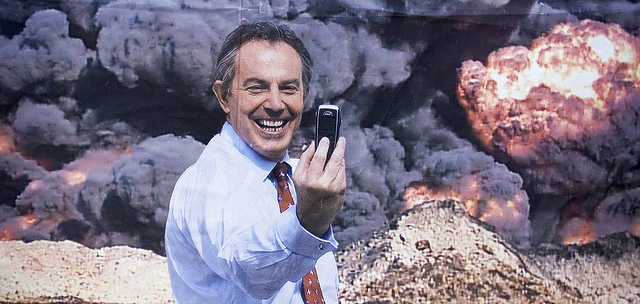The Chilcot Report: what it means for Australia

Dr Judith Betts is an academic at the University of Sydney with a distinguished career in the Commonwealth public service. On 12 July she addressed a near-capacity crowd at Glover Cottages about the UK Chilcot Report. Her perspective was from her analysis of the Australian media coverage of the Iraq invasion in 2003 and subsequent events.
The Chilcot Inquiry, she said, was set up by Gordon Brown. It had open terms of reference. Its conclusions were polite but devastating. Blair had wanted to play an important role in the war, saying he’d do whatever Bush wanted, but was basically ignored. Meanwhile in London, Blair’s key decisions were taken without Cabinet discussion. The existence of weapons of mass destruction was unproven. The invasion had occurred before non-military options had been exhausted. British forces had been unprepared and under-equipped to deal with and survive the harsh conditions they encountered. The devastating consequences of the invasion for the civilian population were either ignored or grossly underestimated.
Prime Minister Howard followed the same narrative in Australia as Blair did in Britain, but was more cautious in his language. He colluded with Blair and Bush, and like them, cherry-picked the intelligence to select the bits that could be confected to support claims about Saddam’s intentions and capabilities. Like Blair, Howard also assured Bush that he would go all the way with him. And while claiming repeatedly in public that he had not yet decided to join the invasion, Howard surreptitiously approved the training of an Australian task force for the invasion months before the invasion date. Days ahead of the actual invasion he had also sent an SAS strike force into western Iraq days to destroy or disarm Iraqi missile batteries aimed at Israel.
Why, asked Judith, did the Labor Opposition not go ballistic when Howard’s dishonesties and miscalculations became evident? Why did the Australian press not expose the conceits and react? Why was there not more than a tepid public reaction to the conclusions of the Jull Report of December 2003 that a convincing case for invading Iraq simply did not exist? Part of the answer might be that Labor was out of the habit of having an independent foreign policy and disinclined to challenge Liberal orthodoxy on the grounds that it might be wedged. And much of the Australian press was owned by Rupert Murdoch, who was habitually pro-war. Only one Murdoch journalist, the well-respected Patrick Walters, was a sceptic. And only the Fairfax newspaper, the Sydney Morning Herald, took a consistent position against the war. So there was no sustained indignation, and the shaky premises on which Australia’s part in the invasion depended prevailed. Judith agreed with many in the audience that an Australian Chilcot type inquiry was desirable, and that the war powers in Australia needed reforming to ensure that parliamentary debate preceded going to war. But like them, she was not optimistic that this would happen soon.
Report by Richard Broinowski